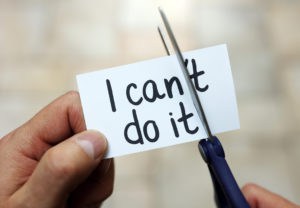Crippled by “Information Avoidance”? Knock it off (here’s how)
Information avoidance – we’ve all faced it. In marketing and management, it can come in the form of ignoring research or KPIs that disagree or refute the campaign premise we so ardently fought for. In our personal life, information avoidance appears in the form of ignoring facts about financial difficulties, health challenges and other worries.
 It’s also called “strategic ignorance” by psychologists and behavioral research experts. But no matter what the name, this phenomenon can cripple companies, torpedo profits, lay waste to relationships, flatten one’s quality of life, and in some cases, possibly serve up some bad medical outcomes (like premature death).
It’s also called “strategic ignorance” by psychologists and behavioral research experts. But no matter what the name, this phenomenon can cripple companies, torpedo profits, lay waste to relationships, flatten one’s quality of life, and in some cases, possibly serve up some bad medical outcomes (like premature death).
How do we get there? We embrace this “strategic ignorance” or “information avoidance” when we refuse to review research that documents Key Performance Indicators, when we won’t look online at our real bank balance after we wrote out all of our bills, when we ignore a nagging cough that makes others concerned.
Why do we clutch so closely such bad and potentially devastating behavior? And more importantly, how do we overcome it?
There is good news, as Elizabeth Bernstein documented in the Wall Street Journal.
Here’s the core cause: we refuse to face the facts because we don’t think we have the psychological or financial resources (real or perceived) to deal with the meaning of negative information. And when we ignore it, silent alarms can go off in our heads that amp up the stress level. It can easily become a vicious cycle.
For insight, Bernstein talked to James Shepperd, a professor of psychology at the University of Florida. Here’s what he said about putting critical information on “ignore”:
“We want to think of ourselves as healthy and smart, people who make good decisions, so we resist information that challenges these beliefs,” says Dr. Sheppard. So what happens? Strategic ignorance becomes a flawed relief mechanism. It turns into a chosen alternative when trust levels are low, when people perceive that they may be forced into a course of action that they abhor or fear. If the facts make us feel bad, then there’s one way out. We’re typically not interested in facing the fire. There’s too much perceived cost. We sneak a peek down the abyss of overload and then instantly draw back.
So, what’s the effective counter?
Dr. Sheppard found that when people are more likely to at least listen to or review anxiety-producing information if feel they have a degree of control over what may happen to them. If they can safely process the emotion-making information, then they may start thinking healthy thoughts that can start down a pathway to a solution.
So, it’s time to face the fire. You’re ready. What now?
Dr. Sheppard advises that we engage in “affirmation invention.” That’s not a new age buzzphrase. That comes when one truly assesses what they really value in life.
What’s your answer? What do you consider to be the most important traits and outcomes in your life?
Moving forward, what’s the practical application of this? Write it down. Take an inventory of your values and thoughts about your values.
As Dr. Sheppard told Bernstein, “This makes whatever threat is looming in front of you feel rather small and your resources to handle it seem larger.”
In the process of writing out this overload inventory, don’t forget that you have at least some control over whatever situation you’re facing. Remind yourself of that straightaway.
Going to miss a critical marketing deadline? Dig in and start working. What work can you get done? Dealing with a mysterious pain that the online diagnostic apps say might be cancer-caused? Remember that you control what treatments you’ll undergo, even if it is the worst case scenario.
I’ll interject here a bit of timeless advice from another source you might not have considered: Dale Carnegie. His “How to Stop Worrying” legendary tome mirrors much of what Dr. Sheppard found. (Here’s a quick updated online summary). Carnegie said to just be honest and lay it out: what is the worst that can happen? If you come to the cognitive and emotional point where you can accept the consequences of the worst thing possible, your mind is released. It shifts gears. You find that you do have more control than you thought you did, which also reduces the mental roadblocks to stop avoiding negative and threatening information.
Have your own story about how to stop avoiding negative information and embracing strategic ignorance or information avoidance? How did your organization or you personally face the fire? Let us know!
By Michael Snyder, Managing Principal, MEK Group
